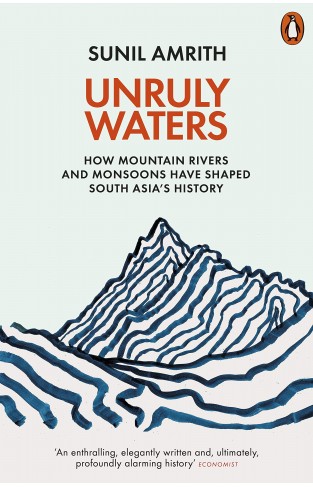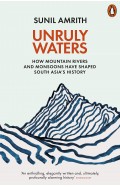- Home
- Non Fiction
- Education and Reference
- Science
- Unruly Waters: How Mountain Rivers and Monsoons Have Shaped South Asia's History
Unruly Waters: How Mountain Rivers and Monsoons Have Shaped South Asia's History
By: Sunil Amrith
-
Rs 2,515.50
- Rs 2,795.00
- 10%
You save Rs 279.50.
Due to constant currency fluctuation, prices are subject to change with or without notice.
South Asia's history has been shaped by its waters. In Unruly Waters, historian Sunil Amrith reimagines this history through the stories of its rains, rivers, coasts, rivers and seas - and of the weather-watchers and engineers, mapmakers and farmers who have sought to control them. He shows how fears and dreams of water have, throughout South Asia, shaped visions of political independence and economic development, provoked efforts to reshape nature through dams and pumps, and unleashed powerful tensions within and between nations.
Every year humans have watched with overwhelming anxiety for the nature of that year's monsoon to be revealed, with entire populations living or dying on the outcome. From the first small weather-reporting stations to today's satellites, the modern battle both to understand and manage water has literally been a matter of life or death.
Today, Asian nations are racing to construct hundreds of dams in the Himalayas, with dire environmental impacts; hundreds of millions crowd into coastal cities threatened by cyclones and storm surges. In an age of climate change, this highly original work of history is essential reading for anyone seeking to understand not only Asia's past but its future.
South Asia's history has been shaped by its waters. In Unruly Waters, historian Sunil Amrith reimagines this history through the stories of its rains, rivers, coasts, rivers and seas - and of the weather-watchers and engineers, mapmakers and farmers who have sought to control them. He shows how fears and dreams of water have, throughout South Asia, shaped visions of political independence and economic development, provoked efforts to reshape nature through dams and pumps, and unleashed powerful tensions within and between nations.
Every year humans have watched with overwhelming anxiety for the nature of that year's monsoon to be revealed, with entire populations living or dying on the outcome. From the first small weather-reporting stations to today's satellites, the modern battle both to understand and manage water has literally been a matter of life or death.
Today, Asian nations are racing to construct hundreds of dams in the Himalayas, with dire environmental impacts; hundreds of millions crowd into coastal cities threatened by cyclones and storm surges. In an age of climate change, this highly original work of history is essential reading for anyone seeking to understand not only Asia's past but its future.
Unruly Waters: How Mountain Rivers and Monsoons Have Shaped South Asia's History
By: Sunil Amrith
Rs 2,515.50 Rs 2,795.00 Ex Tax :Rs 2,515.50
Zubin Mehta: A Musical Journey (An Authorized Biography)
By: VOID - Bakhtiar K. Dadabhoy
Rs 892.50 Rs 1,050.00 Ex Tax :Rs 892.50
Stigma Notes on the Management of Spoiled Identity
By: Erving Goffman
Rs 1,015.75 Rs 1,195.00 Ex Tax :Rs 1,015.75
The Story of the Jews: Finding the Words (1000 BCE – 1492)
By: Simon Schama
Rs 2,965.50 Rs 3,295.00 Ex Tax :Rs 2,965.50
Belonging: The Story of the Jews 1492–1900
By: Simon Schama
Rs 3,436.00 Rs 4,295.00 Ex Tax :Rs 3,436.00
The Book of Why: The New Science of Cause and Effect - (PB)
By: Judea Pearl
Rs 2,515.50 Rs 2,795.00 Ex Tax :Rs 2,515.50
Is Pluto a Planet?: A Historical Journey through the Solar System
By: David A. Weintraub
Rs 6,115.75 Rs 7,195.00 Ex Tax :Rs 6,115.75
Beyond UFOs: The Search for Extraterrestrial Life and Its Astonishing Implications for Our Future
By: Jeffrey Bennett
Rs 4,797.50 Rs 9,595.00 Ex Tax :Rs 4,797.50
The Islamist Why I Became an Islamic Fundamentalist What I Saw Inside and Why I Left
By: Ed Husain
Rs 510.00 Rs 600.00 Ex Tax :Rs 510.00
The Demon Haunted World Science As A Candle In The Dark
By: Carl Sagan
Rs 3,595.50 Rs 3,995.00 Ex Tax :Rs 3,595.50
Stigma Notes on the Management of Spoiled Identity
By: Erving Goffman
Rs 1,015.75 Rs 1,195.00 Ex Tax :Rs 1,015.75
The Story of the Jews: Finding the Words (1000 BCE – 1492)
By: Simon Schama
Rs 2,965.50 Rs 3,295.00 Ex Tax :Rs 2,965.50
Belonging: The Story of the Jews 1492–1900
By: Simon Schama
Rs 3,436.00 Rs 4,295.00 Ex Tax :Rs 3,436.00
The Book of Why: The New Science of Cause and Effect - (PB)
By: Judea Pearl
Rs 2,515.50 Rs 2,795.00 Ex Tax :Rs 2,515.50
Zubin Mehta: A Musical Journey (An Authorized Biography)
By: VOID - Bakhtiar K. Dadabhoy
Rs 892.50 Rs 1,050.00 Ex Tax :Rs 892.50
Unruly Waters: How Mountain Rivers and Monsoons Have Shaped South Asia's History
By: Sunil Amrith
Rs 2,515.50 Rs 2,795.00 Ex Tax :Rs 2,515.50
Stigma Notes on the Management of Spoiled Identity
By: Erving Goffman
Rs 1,015.75 Rs 1,195.00 Ex Tax :Rs 1,015.75
The Story of the Jews: Finding the Words (1000 BCE – 1492)
By: Simon Schama
Rs 2,965.50 Rs 3,295.00 Ex Tax :Rs 2,965.50
Belonging: The Story of the Jews 1492–1900
By: Simon Schama
Rs 3,436.00 Rs 4,295.00 Ex Tax :Rs 3,436.00
The Book of Why: The New Science of Cause and Effect - (PB)
By: Judea Pearl
Rs 2,515.50 Rs 2,795.00 Ex Tax :Rs 2,515.50














-120x187.jpg?q6)









-120x187.jpg?q6)









